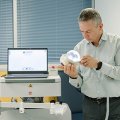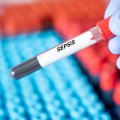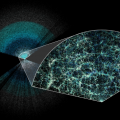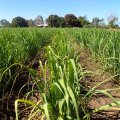
It will soon be possible to grow premium-quality caffeine-free coffee, tea and cocoa, thanks to research involving University of Queensland expertise.
This will offer the 12 per cent of coffee drinkers who choose decaf access to a pure, less-processed product with all the full-bodied flavour of the real thing.
Professor Robert Henry, at UQ’s Queensland Alliance for Agriculture and Food Innovation (QAAFI), said this was one outcome of an international research effort analysing the coffee genome.
“It should soon be possible to select and grow coffee with a pre-determined level of caffeine – ranging from zero-caf to jumpstart,” he said.
“Helping Queensland producers to grow export-quality coffee destined for high-value niche markets is our ultimate goal.”
He said genome sequencing of the coffee plant Coffea canephora confirmed that caffeine had developed independently in various plants.
Professor Henry contributed much of the DNA sequence data used in assembling the coffee genome.
“Coffee, cacao (the source of cocoa and chocolate) and tea appear to share an ability to produce caffeine in their leaves, shoots or stems,” Professor Henry said.
“Although such plants are not closely related, they all synthesise caffeine.
“It seems that during their evolution, each plant independently developed the ability to make caffeine.
“We think caffeine offers plants several advantages, including insecticidal properties and an inhibitory function that prevents seed germination in competing species.
“Our new understanding of the evolutionary origins of caffeine is destined to give us the high-precision tools we need to regulate how caffeine is expressed in a single bean,” Professor Henry said.
QAAFI, which pursues scientific methods to add value to Queensland produce, is also working with flavour scientists and industry partners to unpick the genomic component of premium coffee.
Australia produces a small fraction of the 7.8 million tonne global coffee market, exporting less than 1000 tonnes a year.
“Potentially, Queensland could develop a multi-million-dollar market for high-quality, premium coffees, ranging from full strength to decaffeinated,” Professor Henry said.
QAAFI flavour scientist Dr Heather Smyth said traditional methods of minimising caffeine often led to flavour loss.
“Understanding the origin of caffeine in coffee means that potentially we can develop varieties with low or no caffeine,” she said.
“If the decaffeinating process could be avoided, the beans would retain the full coffee flavour.”
The research findings, The Coffee Genome Provides Insight into the Convergent Evolution of Caffeine Biosynthesis, appear in the journal Science.
Contact: Ron Hohenhaus, QAAFI Communications, ph +61 7 3346 0553, r.hohen@uq.edu.au
About QAAFI
The Queensland Alliance for Agriculture and Food Innovation (QAAFI) is a UQ research institute which was formed as a strategic alliance between The University of Queensland and the Queensland Government. QAAFI brings together scientists from across the plant, animal and food sciences, working closely with the Department of Agriculture, Fisheries and Forestry (DAFF). Its mission is to significantly improve the competitiveness and sustainability of tropical and sub-tropical food, fibre and agribusiness sectors through high-impact science. QAAFI pursues sustainable agriculture and food through science and innovation, and delivers world-leading research in plant, animal, nutrition and food sciences, resulting in discovery, learning and engagement










